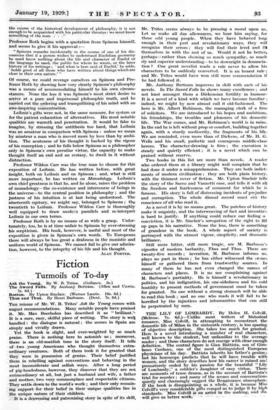Fiction
Turmoils of To-day
Ask the Young. By W. B. Trites. (Gollancz. 5s.)
The Sword Falls. By Anthony Bertram: (Allen and Unwin.
7s. 6d.) Thus and Thus. By Henri Barbusse. (Dent. 7s. 6d.)
THE reissue of Mr. W. B. 'Frites' Ask the Young comes with august recommendations. Many notable people have praised it. Mr. Max Beerbohm has described it as " brilliant. ,
It is a sure, easy, skilful piece of writing. The story is well handled : the dialogue is natural ; the scenes in Spain are simply and vividly drawn.
Yet the book is slight, and over-weighted by so much praise. There is nothing here to astonish us ; moreover, there is an old-maidish tone in the story itself. It tells of two young Americans who thought themselves extra- ordinary creatures. Both of them took it for granted that they were in possession of genius. Their belief justified them in rebelling against conventions and behaving in the most inconsiderate and selfish ways. After a long period
of pig-headedness, however, they discover that they are not extraordinary at all, but just a husband and wife, a father and mother, two very commonplace and respectable citizens.
They settle. down to the world's work ; and their only remain- ing support for their belief in their • unique qualities lies in the unique nature of their children.
.'.It is a depressing and patronizing story in spite of its skill. Mr. Trites seems always to be pressing a moral upon us. Let us make all due allowances, we hear him saying, for these odd young people. When they have behaved long enough in their pert and revolutionary ways, they will recognize their errors ; they will find their level and fib themselves in with the rest of us. Would it not be better, perhaps-r-rather than showing so much sympathy, so much sly and superior understanding—to be downright in denuncia- tion ? One great novelist made a rule never to allow his characters to be suddenly converted. It is an honest rule ; and Mr. Trites would have won still more commendation if he had followed it.
Mr. Anthony Bertram improves in skill with each of his novels. In The Sword Falls he shows many excellences ; and not least amongst them a Dickensian fertility in humour- It is a novel of a kind with which we have become familiar ; indeed, we might by now almost call it old-fashioned. The hero is Mr. Albert Robinson, the managing clerk of a firm of solicitors. We are introduced to his hopes and ambitions, his friendships, the troubles and pleasures of his domestic life. The War comes, and Mr. Robinson's world is in ruins. In the end he is left without prop or comfort, building together again, with a sturdy mediocrity, the fragments of his. life. We are reminded, even more than of Dickens, of Mr. H. G. Wells and his small, pathetic and courageous middle-class heroes. The character-drawing is firm ; the execution is steady and quietly efficient ; it is a novel which can be praised without reserve.
Two books in this list are more than novels. A reader who ordered them at a library might well complain that he had done it under a misapprehension. They are both indict- ments of modern civilization ; they. are both plain history, with the thinnest cover of fiction. Mr. Upton Sinclair tells the story of the Sacco and Vanzetti case, and tells it with all the freedom and fearlessness of comment for which he is famOus. His story is full of distressing incidents of prejudice and corruption. The whole dismal record must stir the conscience of all who read it.
As a novel it is by no means great. The patches of history make it ungainly, and the interweaving of fact and inventio!. is hard to justify. If anything could reduce our feeling o conviction, it is Mr. Sinclair's arrogation of the right to fill up gaps in his narrative. None the less, there is something of grandeur in, the book.. whole aspect of society is portrayed with the utmost vigour, simplicity, and dramatic brilliance.
Still more bitter, still more tragic, are M. Barbusse's vignettes of modern barbarity, Thus and Thus. There are twenty-five records ; invention, M. Barbusse informs us, plays no part in them ; he has either witnessed the scenes himself or gathered them from trustworthy sources. In many of them he has not even changed the names of characters and places. It is no use complaining against M. Barbusse's partiality. He is himself a revolutionary in politics, and his indignation, his one-sidedness and his cold hostility to present methods of government must be taken for granted. No one without a strong stomach will be able to read this book ; and no one who reads it will fail to be horrified by the injustices and inhumanities that can still be perpetrated by men.






































 Previous page
Previous page